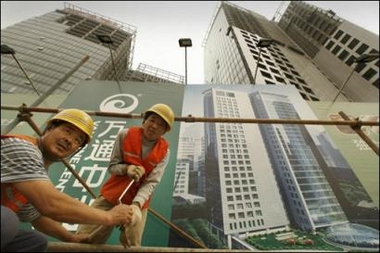China's banks may significantly raise the
percentage of downpayment for luxury house purchases as the central government
continues to cool speculative fever and rein in rising property prices.
 | |
Chinese labourers work on a new housing
project in Beijing. Banks may significantly raise the percentage of
downpayment for luxury house purchases as the central government continues
to cool speculative fever and rein in rising property prices. [file
photo] |
Domestic commercial banks should discourage lending to investors who buy more
than one house or luxury apartment, villa and retail property by significantly
raising the percentage of the downpayment, China Banking Regulatory Commission
said in a statement on its Website on Thursday.
"Commercial banks should keep a close watch on borrowers' repayment ability
and their credit record," said the statement, citing commission's chairman Liu
Mingkang who made the comment at a meeting with executives of major Chinese
banks earlier this week.
Liu, however, urged banks to promote loans to first-time home owners.
There was speculation that the central bank would raise the percentage of the
downpayment for mortgage loans for all types of houses to 50 percent from 30
percent, raising concerns among average home buyers.
A formal guideline by the commission is expected to come out soon for banks
to follow, said an official with the mortgage department of Shanghai Pudong
Development Bank Company, who preferred to be unnamed.
Jacky Feng, manager of Midland Shanghai, a Hong Kong-based real estate
agency, said if there were such a policy, it would raise the threshold for
investors and slow transactions of luxury houses.
"Take a 1.8 million yuan (US$225,000) apartment for example, a 10 percent
increase in the minimum downpayment percentage would require an additional
180,000 yuan immediately," Feng said.
"Coupled with the higher transaction tax enacted last year, there will be
fewer high-end homes changing hands," he said. "This will curb developers from
building luxury houses."
Some analysts criticized the central government for again using a general
policy to impact the markets which differ greatly nationwide.
"It's like a blunt tool that may cause some unintended consequences," said
Michael Hart, head of research of Jones Lang LaSalle in Shanghai.
"The policy is aimed at stopping investors, but in some places those getting
hurt most will be homeowner buyers. Those who want to change from renting to
owning will have to live in rented houses longer before they save enough money
to pay the higher downpayment," Hart said.